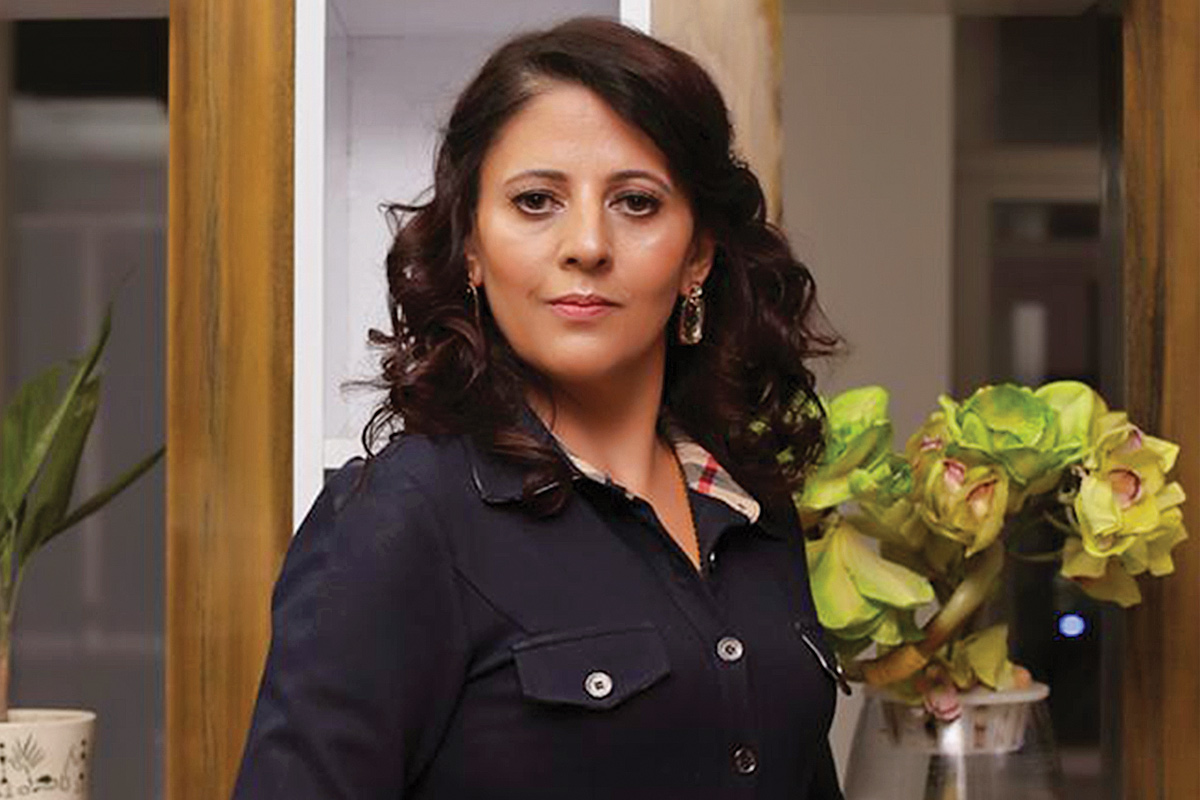
Shailaja Adhikary established IEC Group in 1997 with IEC School of Art & Fashion, the first fashion and interior design institute in Nepal. In 2007, they added another vertical to their business, a pre-school. Euro Kids was opened at Tangal, followed by Euro School and Euro Kids branches. After which they added another dimension to their identity, Euro Kids Teachers Training. Now they also have IEC College of Art & Fashion in their repertoire. The commonly held notion is that Adhikary leads all the Euro Kids branches in Nepal. Of the 42 Euro Kids branches, she manages only four, the ones at Tangal, Samakhushi, Hattigauda and Tinkune. According to Adhikary, the quality education they deliver gives value for money and that’s the reason parents trust the brand.
For this edition of Hi5, Ujeena Rana sat down with Shailaja Adhikary to know about important aspects of her life:
When I Was 21 Years Old
I started IEC school at 21. I weighed only 47 kgs at that time. During my lunch break at Grindlays Bank (now Standard Chartered), I used to visit other banks to approach for loan for my business. But credit managers did not trust me. Possibly, they were not convinced that a 21-year-old girl who looked as thin as a matchstick could do business. Finally, NCC Bank was positive but demanded collateral which my father arranged for. The fact that my father had helped me with the collateral put an extra burden on me to succeed in my business because I am not his only child and he had to support and invest in my siblings too and I knew that I had to pay him back sooner than later. We started IEC School with classes on computer, fashion and interior design in the hope that if one does not do well, the other will support it. In the initial phase, computer courses witnessed exponential growth whereas, fashion and interior design were close to being a debacle because people did not know about the career alternatives in those areas. However, from 2003 onwards saturation started in computers so we closed that wing and continued with fashion and interior design. I was a young principal when I started IEC; my first batch students were more like my friends.Inspiration
My mother lost her father when she was very young, so she started working from an early age. She started teaching after grade 10. Later she joined a bank but continued with her studies. My father was the only son and because of his privileged upbringing he did not feel the need to do much hard work. When I was working at Grindlays, my father was the one who said that if I was not happy with my job, I should leave it. But my mother forbade me from doing so. She said that until and unless I have an option, I don’t dare quit. In that way, my parents came from different schools of thought. My mother used to put the message in our head that we should not count on our father for too long. We are six siblings - five daughters and a son. Our mother encouraged all her children to establish their own identity. She underlined the fact that we need to earn for ourselves, not just for the money but also for our financial independence. She wanted us to be well-educated. Even now, we seek her suggestions. She is over 70 but she keeps herself informed about our lives and businesses and what’s happening inside the country. All of her children are involved in the education sector in one way or another, and all of us are doing well. A large part of our success is due to her.A Decision that Changed My Life Course
People make decisions all the time, big and small. Some are the outcome of sleepless nights and some are made in a jiffy. A singular life decision that transformed my life sequence has to be my decision to leave my job at the bank and start my own business. In 1996-97, I was working in the Reconciliation Department at Grindlays Bank. Since both my parents were bankers, I was prepared for a job in a bank because it is considered to be a secure and respectable job. Only later did I realise that my personality and job requirements are mismatched. My job required that I sit the whole day in one place and reconcile clients’ money. I am a restless person.Sometimes I start singing and dancing if my heart desires. At times when I sang at job, my colleagues used to look at me with quizzical eyes. You need to enjoy your work but I was not even close to being happy. Besides, every day was the same.I realise that my personality and job requirements are mismatched. My job required that I sit the whole day in one place and reconcile clients’ money. I am a restless person.Sometimes I start singing and dancing if my heart desires. At times when I sang at job, my colleagues used to look at me with quizzical eyes.My father sensed my dissatisfaction at work. When I was in grade 8, my parents had quit their jobs and had started a carpet factory which gave me a chance to know the inside of running a business very closely. I saw how my parents handled staff and workers and how they dealt with clients. I was observing and absorbing business lessons from them. Since I had been helping my father with his business, he saw in me the zeal and potential to do business. He suggested that I should start something of my own and that I would be better off that way. After 10-15 days of toying with the idea to start a business, I quit my job. Ultimately, I established IEC with 13 students.
Teamwork
A company is not run only by its leader. You need the support of your team to materialise your vision. As they say, you are as strong or weak as your team. You have to have the right people in your team to share your vision and ambition with. I owe my success to every single person on my team. I empower my team members in a way that tomorrow they can open their own business. I make plans but my team is the one to execute it and help me translate that into reality. I will be monitoring their work, supporting them, standing with them but they are the real doers. I am running multiple organisations and I cannot be everywhere at the same time. So I have to trust people; I have to make them feel comfortable and I have to give them the ownership of the job. I make every single one working under me feel that the organisation is theirs and that they belong here. If it flourishes, so will they.Women as Leaders
Though there may not be anything such as intrinsic male or female qualities per se but whatever we females do, we do it with passion. It is not just about hard work; it is about working passionately whether that be taking care of the house or the business. Moreover, women don’t harbour ego. I treat everyone in my team equally. We work together in a team and we are equals. A leader has to promote egalitarianism. I never feel like a boss here. We are here to work together for the institution whether that be at IEC or Euro Kids. A great quality of most women is that they feel the pain of others. Women are empathisers; they understand others’ feelings and they treat others in that manner. Being a leader is not only about commanding all the time. You have to sympathise with them, empathise with them, understand their pain, support them, lend them a helping hand so that they will stand with you in the trying times as well. Women are doing remarkably well in education and other sectors in Nepal and elsewhere. More women in leadership positions encourage young women to see themselves in those positions.
Published Date: March 30, 2021, 12:00 am
Post Comment
E-Magazine
RELATED Hi5



.jpg)

.jpg)